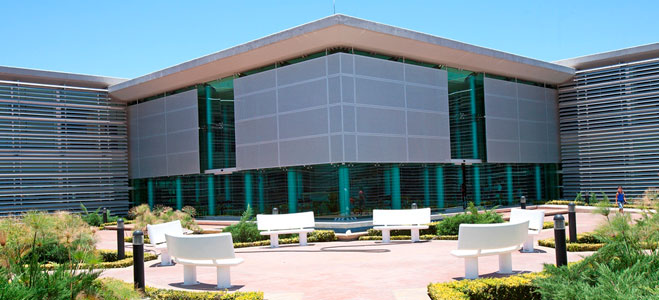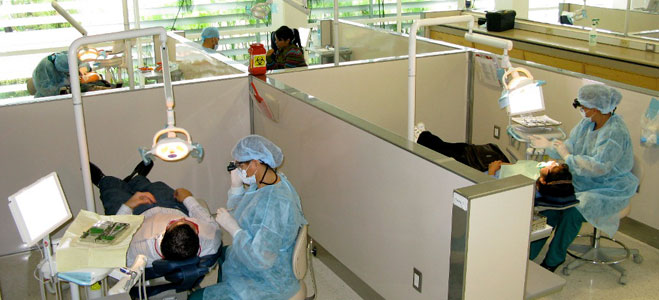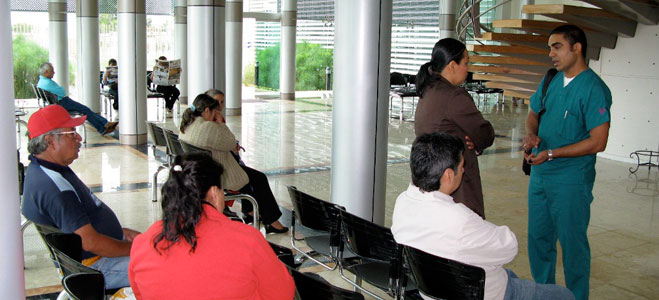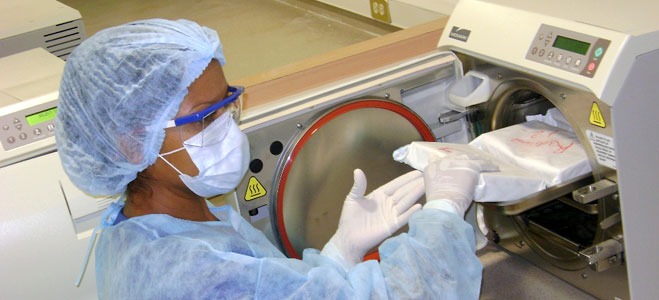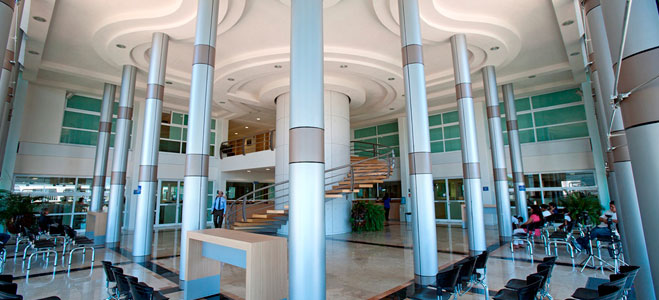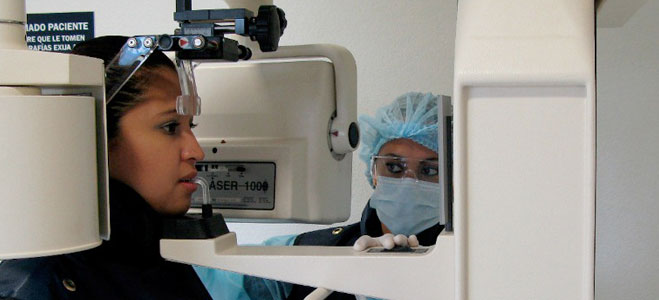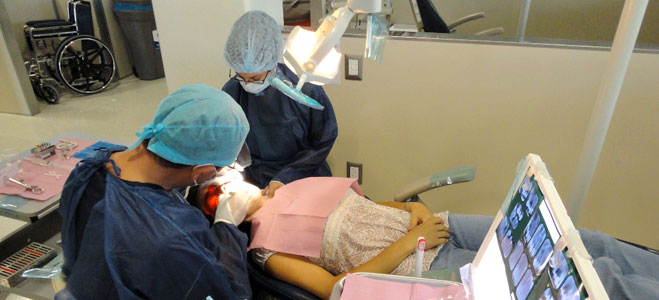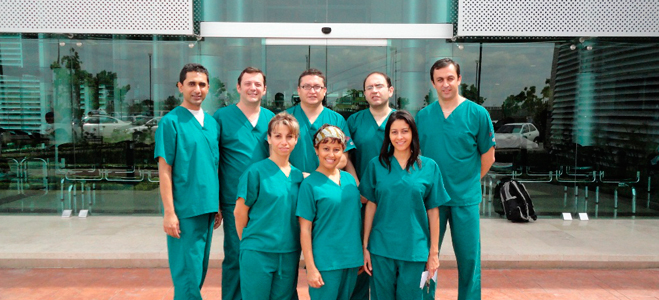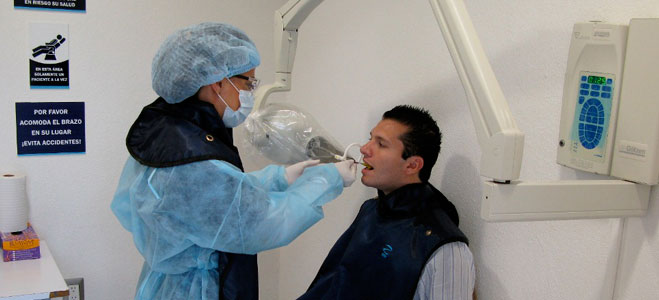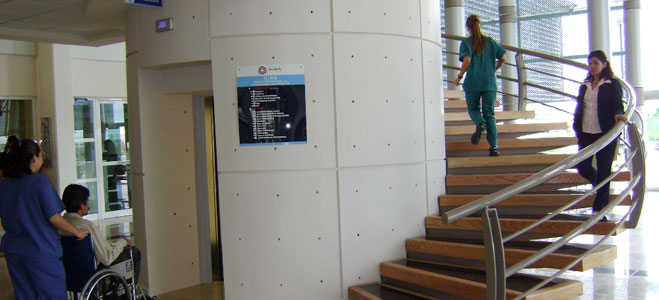INTERNATIONAL DENTAL PROGRAM OF DE LA SALLE versión en español
- Introduction
- General description of the program
- Admission documents
- Deadline to receive documents
- León, Guanajuato
- Financial Aid
- Contact Us
The University of La Salle Bajío is located in Leon, Guanajuato, in Mexico. It is an Institution that has dedicated more than 44 years to Superior Education. University of La Salle Bajio offers 28 bachelor's degree programs, 4 Profesional Asociado and 33 post-graduate programs. The number of students within the University is of 13,500 among its 5 campus.
University of La Salle Bajio is accredited by FIMPES (Federation of Mexican Private Superior Education Institutions), it has been awarded the acknowledgement of Academic Excellence by the Mexican Ministry of Education (SEP).
The School of Dentistry of University of La Salle Bajío, started in 1975 and nowadays it is considered one of the best dental schools in the country. Since 2002 it has been a Dental School accredited by the Dental Board of California, and since 2001 it has been member of the National Council of Dental Education (CONAEDO).
In May 2012, the School of Dentistry at the University La Salle Bajío got the re- accreditation by the Dental Board of California for a period of seven years.
In April 2006, the Dental Board of California approved La Salle's "Curso Internacional de Revalidación en Odontología" (CIRO) (International Dental Program), which was designed to help dentists accomplish the educational process required for the dental license validation in the State of California. This will allow the dentist to practice dentistry in the State of California. This program was thought for dentists who graduated from dental schools outside the United States.
In April 2022, the agency CDCA-WREB-CITA performed the first dental examination process, becoming Universidad La Salle Bajio the first school outside the USA with this facility.
Our School
Mission Statement of the School of Dentistry
The Mission of the University La Salle Bajío Dental School is to prepare individuals through an integrated learning process to develop the necessary knowledge, skills, attitudes, and values through high-quality education, dedication to research and devotion to community service in order to provide excellent dental healthcare to the public.
The La Salle Bajío Dental School graduates will be committed to continuously updated education, open to innovation, and committed to the implementation of prevention schemes to manage and treat oral illnesses, through an ethical and efficient general Dentistry practice.
Vision Statement of the School of Dentistry
The vision of the UDLSB-DS is to be recognized as the best Dental School in the nation of Mexico and to develop International visibility based on the quality of our educational, oral health care, research and community service programs, and the efforts of our graduates to address the oral health needs of the public.
accredited by

Dental Board of California
The CIRO (IRDP) is divided in two stages: the first stage is a six weeks standardization course of 250 hours. The second stage is going to be held during 4 semesters (2 years).
Because CIRO (IRDP) is a bilingual program, the non Spanish speaker admitted students must take an intensive Spanish course December previously to the CIRO (IRDP) Program beginning. A SIELE certification will be required once you have finished the Spanish intensive course.
To join the Internacional Dental Program we require:
1. Fill out and sign the application. (application form)
2. Copy translated to English of birth certificate.
3. Two copies of passport.
4. Three recent letters of recommendation in a closed and sealed envelope: Two practicing dentists and one personal.
5. Statement of purpose (no more than 2 sheets of paper).
6. Certificate of health (a written from a Physician confirming that the applicant does not have any chronic or communicable diseases).
7. Translated to English copies of: professional diploma and professional license.
8. Physical and Original report “Course by Course” from the Educational Credential Evaluator Inc. (Original and one copy) https://www.ece.org/ECE/Institutions/Institution-Reports
9. One recent passport size photograph attached in the application form.
10. Professional Curriculum Vitae (resume).
11. TOEFL score: 213 (CBT) or 73 (IBT) Physical and Original, plus one copy.
12. National Dental Board Exam 1 and 2 (NDBE-1, NDBE-2) minimum score 75 pts. Or pass. Or in its defect Integrated National Dental Board Exam (INDBE). Original or request to ADA to send the result to the email ciro@lasallebajio.edu.mx
13. Take and pass the theoretical and practical admission exam administered by LaSalle.
14. Personal interview with the Program Admissions Committee on the same day as the admission test.
15. Non-refundable application fee in the amount of $300.00 US dollars to:
Payment in México
* Do not send check, nor money order, nor cash.
OTHER DOCUMENTS
FOR MEXICAN CITIZENS
1. Copy of birth certificate
2. Copy of CURP
FOR NON MEXICANS CITIZENS
1. Translated to English, notarized and apostilled copy of a birth certificate.
2. Copy of passport.
Deadline to receive documents for class 2024-2026 will be on March, 15th, 2024.
Opening subject to a minimum quota of approved applicants.
All documents shall be sent in one closed package. Documents should be sent to:
Universidad La Salle Bajío, Campus Juan Alonso de Torres
Clínica Internacional de Odontología
Dr. José Luis Castellanos Suárez
Blvd. J. Alonso de Torres No. 3602
Colonia Maravillas
León, Guanajuato
C.P. 37458
MÉXICO
Phone +52477 7197611
More information:
ciro@lasallebajio.edu.mx
jcastellanos@lasallebajio.edu.mx
The state of Guanajuato is located in the central region of Mexico known as "El Bajío". The city of Leon is located to the north of the state, on the limits with the state of Jalisco.
It has a population of 1,924,771 inhabitants and it is mainly an industrial city in the manufacture of leather and footwear, although in the last decades, the profile has been shifting towards other industries as well as services. The weather is semi-desert with 350 days of sun and an average temperature of 27°C, spring being the driest, hottest season of the year, reaching up to 38°C.
Its location is optimal since it is only a few hours driving time from some of the most important cities in the center of the country such as: Mexico City is no more than 4 hours away, Queretaro, San Luis Potosi, Guadalajara and Aguascalientes are only around two hours from Leon. In addition, Leon is communicated by airplane to the main cities in Mexico, the United States, Canada and Europe.
Canadian and U.S. Citizens interested in studying our Dental programs may be eligible to apply for financial aid to help you with your Cost of Attendance (COA). Please read the information thoroughly; it is your responsibility to secure funding for your entire program regardless if funding is available or denied.
Canadian Loans
For information about the loans the Government of Canada offers to eligible full and part-time post-secondary students, visit the Government of Canada student loans website.
For assistance filling out your enrollment confirmation forms contact the Financial Aid Office located in Campus Campestre.
Contact: Elizabeth Torres
Phone number: +52 (477) 710 8500 Ext. 4422
E-mail address: etorrest@lasallebajio.edu.mx
Hours: Monday through Friday from 9:00 a.m. to 6:00 p.m.
In the event enrollment confirmation forms were completed for your Canadian funding, and you later suspend, withdraw or otherwise change status, please contact your loan provider to see if any further paperwork is needed.
United States Loans
The Universidad La Salle Bajío is foreign institution eligible to participate in the Federal Student Aid Program, our School Code is 037765.
Although, it may be possible to fund your entire education through Federal Student Aid, we recommend a conservative approach to borrowing. We also encourage you to save as much as possible before enrolling, so that you may avoid a heavy debt burden. For more information regarding Federal Student Aid, visit the Federal Student Aid website.
The eligible programs for Federal Student Aid, Title IV funds are:
Dentistry Dual-Degree Program
CIRO – International Dental Program
The Dentistry Dual-Degree Program, is currently not accepting new students. For more information, please contact the Faculty of Dentistry:
Laura María Díaz Guzmán
Directora Académica
Facultad de Odontología
(477) 710 85 00, ext. 2800
lmdiaz@lasallebajio.edu.mx
Note: The Dentistry Dual-Degree Program is considered an undergraduate level program for the first three years; therefore, undergraduate loan limits apply. Once enrolled in the seventh semester students are considered Professional Students, and graduate loan limits apply.
The CIRO - International Dental Program, currently has two enrollment dates:
• For starting date June 10, 2024, it is recommended that prospective students submit their FAFSA application no later than April 30, 2024, to ensure funding is available by July 2024.
• For starting date July 23, 2024, it is recommended that prospective students submit their FAFSA application no later than May 31, 2024, to ensure funding is available by August 2024.
Contact: Elizabeth Torres / Phone number: 52 (477) 710 8500 Ext. 4422
E-mail address: etorrest@lasallebajio.edu.mx
Hours: Monday through Friday from 9:00 a.m. to 6:00 p.m.
The Financial Aid Office is located in Campus Campestre.
La Salle Bajío does not administer any other loan programs at the moment.
• Be a US citizen, or eligible noncitizen
• Have a valid Social Security number
• Have a High School Diploma or its equivalent
• Be enrolled at least half-time in an eligible program
• Be making Satisfactory Academic Progress (SAP), make sure you read the SAP Policy
• Not be in default on any federal funds
The University offers two eligible programs:
CIRO / International Dental Program.
Dentistry Dual-Degree Program (this program is currently not accepting new students)
(Note: These two academic programs do not participate in University’s exchange program)
The federal loan eligibility criteria are subject to change at the US Department of Education’s discretion, and are beyond the University's control. To check the latest eligibility criteria, visit the Eligibility Requirements | Federal Student Aid..
Note: The Universidad La Salle Bajío can only approve loans for students who meet the criteria set by the US Department of Education.
How much can I borrow?
The amount of aid you are eligible to request depends on various factors such as:
• Location of University, domestic or foreign
• Type of Program
• Grade level
• Whether you are classified as dependent or independent student
Location
The University La Salle Bajío is classified as a foreign school. Foreign schools can only offer aid through loans.
Type of program and grade level
For Federal Student Aid purposes:
The Dentistry Dual-Degree Program is an Undergraduate program until the sixth semester; once enrolled in the seventh semester it becomes a professional program; loan limits apply accordingly. It is currently not accepting new enrollment.
The CIRO-IDP is a Professional Program, and its students are classified as Professional Students; graduate/professional students loan limits apply.
Whether you are a dependent or independent
This condition applies only to undergraduate students.
The annual loan limit amount depends on the grade level and classification Dependent vs Independent.
For purposes of Federal Student Aid, a student is considered an independent student, if they meet one or more of the following criteria:
• Is at least 24 years old by 31 December of the award year;
• Is married as of the date the FAFSA is completed;
• Is working on a masters or doctorate program at the beginning of the award year for which the FAFSA is completed;
• Is currently serving on active duty in the U.S. armed forces for purposes other than training;
• Is a veteran of the US Armed Forces;
• Has at least one child who receives more than half of his or her support from the student;
• Has a dependent, other than a spouse or a child, who lives with the student and receives more than half of his or her support from the student at the time the FAFSA is completed and through 30 June of the award year;
• At any time since turning age 13, were both parents deceased, and in foster care, or were a dependent or ward of the court;
• Was determined by a court in their state of legal residence to be an emancipated minor or that someone other than the parent or stepparent has legal guardianship.
To learn visit Do I Have to Provide My Parents’ Information on the FAFSA Form? (studentaid.gov).
Type of Aid available for undergraduate students
Students enrolled in an undergraduate program may qualify for the following loans:
• Direct Subsidized Loan – Must demonstrate need
• Direct Unsubsidized Loan – Not based on need
• Direct Parent Plus Loan – Only for students classified as dependents
| Questions | Direct Subsidized loan | Direct Unsubsidized loan | Parent PLUS loan (Undergraduate) |
|---|---|---|---|
| Who is eligible? | A dependent student who demonstrate financial need. | A dependent and independent student. Not based on financial need. | Parents (biological, adoptive, or in some cases, stepparent) of dependent enrolled in undergraduate courses. Both the parent and the student must be eligible for federal student aid. A credit check is required. |
| How do repayments work? | No interest or payment required as long as you are enrolled on an eligible course at least half-time. | No payments required as long as you are enrolled on an eligible course at least half-time. However, interest accrues while you are studying. | No payments required as long as the dependentstudent is enrolled on an eligible course at least half-time. However, interest accrues while you are studying. |
| When does repayment start? | Six months after your course finishes, known as the “grace period” or you become less than half-time, or withdraw. | Six months after your course finishes, known as the “grace period” or you become less than half-time, or withdraw. | PLUS loans have no grace period. Repayment period begins on the date of the final disbursement. Unless you receive a deferment or forbearance. |
Loan Limits for students enrolled in an undergraduate program
| Year | Dependent Students (except students whose parents are unable to obtain PLUS Loans) | Independent Students (and dependent undergraduate students whose parents are unable to obtain PLUS Loans) | Parent Plus |
|---|---|---|---|
| First-Year Undergraduate Annual Loan Limit | $5,500 $3,500 in Subsidized Loans $2,000 in Unsubsidized loans |
$9,500 $3,500 in Subsidized Loans $6,000 in Unsubsidized Loans |
For dependent undergraduate students only. Total amount remaining after all other aid/loans have been deducted from COA |
| Second-Year Undergraduate Annual Loan Limit | $6,500 $4,500 in subsidized Loans $2,000 in Unsubsidized loans |
$10,500 $4,500 in Subsidized Loans $6,000 in Unsubsidized Loans |
For dependent undergraduate students only. Total amount remaining after all other aid/loans have been deducted from COA |
| Third-Year and Beyond Undergraduate Annual Loan Limit | $7,500 $5,500 In Subsidized Loans $2,000 in Unsubsidized Loans |
$12,500 $5,500 in Subsidized Loans $6,000 in Unsubsidized Loans |
For dependent undergraduate students only. Total amount remaining after all other aid/loans have been deducted from COA |
| Subsidized and Unsubsidized Aggregate Loan Limit | $31,000—No more than $23,000 of this amount may be in subsidized loans. | $57,500 for Undergraduates —No more than $23,000 of this amount may be in subsidized loans. | Parent PLUS loans do not have a set limit. The institution’s Cost of attendance (COA) is the limit. |
For more information visit the Federal Student Aid website at Subsidized and Unsubsidized Loans | Federal Student Aid
To learn more about repayment, visit: Repayment Plans | Federal Student Aid
Interest rates and additional fees
The interest rate varies depending on the type of loan, and the date the loan is first disbursed.
The table below provides interest rates for Direct Subsidized, Direct Unsubsidized, and Direct PLUS Loans first disbursed on or after July 1, 2023, and before July 1, 2024.
Other than interest is there a charge for these loans?
Yes, most federal student loans have loan fees that are a percentage of the total loan amount. The loan fee is proportionately deducted from each loan disbursement you receive while enrolled in school.
This means the money you receive will be less than the amount you actually borrow. However, you are responsible for repaying the entire amount you borrowed and not just the amount you received.
The chart below shows the loan fees
| Loan Fees for Direct Subsidized Loans and Direct Unsubsidized Loans | |
|---|---|
| Firs Disbursement Date | Loan Fee |
| On or after 10/1/20 and before 10/1/24 | 1.057% |
| On or after 10/1/19 and before 10/1/20 | 1.059% |
| Loan Fees for Direct PLUS Loans | |
| Firs Disbursement Date | Loan Fee |
| On or after 10/1/20 and before 10/1/24 | 4.228% |
| On or after 10/1/19 and before 10/1/20 | 4.236% |
The Dentistry – Dual Degree Program is currently not accepting new students
Disbursement information
Disbursements for students enrolled in the Dentistry Dual-Degree Program are programmed per Academic year at the beginning of each semester, one installment in August and one in February.
Within three working days of the University receiving the funds, the amounts for tuition and fees are applied to the institutional account, and any excess balance is paid directly to the student, within 14 days, of arrival date.
Things to consider:
• Foreign schools are subject to a 30-day disbursement delay.
• Once money is disbursed you must remain enrolled on at least a half-time basis otherwise you may lose eligibility, and may be asked to repay the funds immediately.
• In the event you need to cancel any aid, request a Leave of Absence, or withdraw from the Program, you must contact the Financial Aid Office immediately.
• La Salle Bajío can only process loans for students who meet the criteria set by the US Department of Education.
• It is your responsibility to secure funding for your entire program regardless if funding is available or denied.
How much can I borrow?
The amount of aid you are eligible to request depends on various factors such as:
• Location of University, domestic or foreign
• Type of Program
• Grade level
• Whether you are classified as dependent or independent student
Location
The University La Salle Bajío is classified as a foreign school. Foreign schools can only offer aid through loans.
Type of program and grade level
For Federal Student Aid purposes:
The Dentistry Dual-Degree Program is an Undergraduate program until the sixth semester; once enrolled in the seventh semester it becomes a professional program; loan limits apply accordingly.
The CIRO-IDP is a Professional Program, and its students are classified as Professional Students; graduate/professional students loan limits apply.
Whether you are a dependent or independent
This condition applies only to undergraduate students.
Type of Loans available for Graduate/Professional students
Students enrolled in the CIRO program are eligible to apply for two types of loans:
• Direct Unsubsidized, and
• Direct PLUS
To learn visit Loans | Federal Student Aid
| Questions | Direct Subsidized loan | Direct Unsubsidized loan | Direct PLUS loan (Graduate/Professional) |
|---|---|---|---|
| Who is eligible? | Not eligible | Graduate/Professional student. Not based on financial need. | Graduate/Professional student. A credit check is required. Not based on financial need. |
| How do repayments work? | No payments required as long as you are enrolled on an eligible course at least half-time. Interest accrues while you are studying. | No payments required as long as you are enrolled on an eligible course at least half-time. Interest accrues while you are studying. | |
| When does repayment start? | Six months, known as the “grace period”, after your course finishes or you become less than half-time. | Six months, known as the “grace period”, after your course finishes or you become less than half-time. |
To learn more about repayment, visit the federal student aid website at Repayment Plans | Federal Student Aid
Loan Limits for Graduate / Professional Students
| Year | Unsubsidized Loan | PLUS Loan for Graduate or Professional Students |
|---|---|---|
| Graduate or Professional Students Annual Loan Limit | $20,500 (unsubsidized only) | Total amount remaining after all other aid/loans have been deducted from COA |
| Subsidized and Unsubsidized Aggregate Loan Limit | $138,500 for graduate or professional students—No more than $65,500 of this amount may be in subsidized loans. The graduate aggregate limit includes all federal loans received for undergraduate study. |
Interest rates and additional fees
The interest rate varies depending on the loan type, and the date the loan is first disbursed.
The table below provides interest rates for Direct Subsidized, Direct Unsubsidized, and Direct PLUS Loans first disbursed on or after July 1, 2023, and before July 1, 2024.
Other than interest is there a charge for these loans?
Yes, most federal student loans have loan fees that are a percentage of the total loan amount. The loan fee is proportionately deducted from each loan disbursement you receive while enrolled in school.
This means the money you receive will be less than the amount you actually borrow. However, you are responsible for repaying the entire amount you borrowed and not just the amount you received.
The chart below shows the loan fees
| Loan Fees for Direct Subsidized Loans and Direct Unsubsidized Loans | |
|---|---|
| First Disbursement Date | Loan Fee |
| On or after 10/1/20 and before 10/1/24 | 1.057% |
| On or after 10/1/19 and before 10/1/20 | 1.059% |
| Loan Fees for Direct PLUS Loans | |
| Firs Disbursement Date | Loan Fee |
| On or after 10/1/20 and before 10/1/24 | 4.228% |
| On or after 10/1/19 and before 10/1/20 | 4.236% |
Cost of attendance varies by program and by year of initial enrollment
CIRO International Dental Program
Cost of Attendance
Academic Year 2024-2026
Student with Foreign Graduate Degree CIRO XXII
* Tuition for a student with a Mexican University Degree $30,500.00
* Tuition for an alumni $28,500.00
** Fees are estimated for a full-time one year of enrollment
All amounts are in US Dollars
It takes 2 (two) years to complete the degree.
The required courses total 254 credits to graduate.
* Fees are estimated for a full-time one year of enrollment.
Disbursement information
Disbursements for the CIRO-IDP are scheduled according to the year of enrollment. Please be aware that foreign schools are subject to a 30-day disbursement delay.
• For students enrolled in the 1st year, the disbursements are programmed per semester; total cost of semester, disbursed in two equal installments.
• For students enrolled in the 2nd year, the total Cost of Attendance (COA) is disbursed in two equal installments; one disbursement for the third semester, and one for the fourth semester.
Within three working days of the University receiving the funds, the proportion for tuition and fees are applied towards student’s institutional account, and any excess balance is paid directly to the student, within 14 days, of the funds arriving.
-
• Foreign schools are subject to a 30-day disbursement delay.
• Once money is disbursed you must remain enrolled on at least a half-time basis otherwise you may lose eligibility, and may be asked to repay the funds immediately.
• In the event you need to cancel any aid, request a Leave of Absence, or withdraw from the Program, you must contact the Financial Aid Office immediately.
• La Salle Bajío can only process loans for students who meet the criteria set by the US Department of Education.
• It is your responsibility to secure funding for your entire program regardless if funding is available or denied.
For more information regarding the Federal Student Aid Loans, please visit:
Loans | Federal Student Aid
Note: For Federal Student Aid purposes the Universidad De La Salle Bajío, A.C. is considered a foreign school; therefore, the aid available is through loans only, and the applications and Loan Agreements (MPNs) must be completed yearly.
NOTE: Foreign Educational Institutions are not required, as a matter of Title IV eligibility to obtain an EIN, and complete Form 1098-T for U.S. students enrolled. Therefore, the Universidad De La Salle Bajío, A.C. does not have an EIN, consequently, does not provide the Form 1098-T to students.
Step 1° – Application
To determine your eligibility for federal loans you must first complete a Free Application for Federal Student Aid (FAFSA). The link is FAFSA® Application | Federal Student Aid
• School Code – 037765
• For additional information on how to complete the FAFSA, visit 2024–25 FAFSA® Help | Federal Student Aid
Graduate / Professional Students can request two types of loans Direct Unsubsidized and Direct PLUS. For additional information regarding the Graduate/Professional Direct PLUS Loan, visit: Grad PLUS loans | Federal Student Aid
To apply for a Graduate/Professional PLUS loan PLUS Loan Application | Federal Student Aid
Parents of Undergraduate students can apply for the Parent PLUS loan. To learn more visit, Parent PLUS Loans | Federal Student Aid
To apply for a Parent PLUS loan PLUS Loan Application | Federal Student Aid
Note: Federal student loans are real loans, just like car or mortgage loans. You must repay a student loan even if your financial circumstances become difficult. Federal student loans usually can’t be written off in bankruptcy. They can’t be canceled because you didn’t get the education or job you expected, and they can’t be canceled because you didn’t complete your education, unless you couldn’t complete your education because your school closed.
Step 2° – Complete the Master Promissory Note(s) MPNs)
You must to complete a Master Promissory Note (MPN) for each type of loan you will be requesting. MPNs are completed at Completing a Master Promissory Note | Federal Student Aid
Undergraduates Students need to complete the Subsidized and Unsubsidized MPN.
Graduate/Professional Student must complete an MPN for each type of loan requesting (Unsubsidized and PLUS, if requesting both loans).
Parent Borrowers must complete the Parent PLUS loan MPN.
Step 3° – Complete Entrance Counseling
All first-time borrowers must complete an Entrance Counseling.
Make sure you choose the correct entrance counseling, the one for Graduate/Professional students at Entrance Counseling | Federal Student Aid
Step 4° – Annual Student Loan Acknowledgement
If this is your first time accepting a federal student loan, you are acknowledging that you understand your responsibility to repay your loan.
If you have existing federal student loans, you are acknowledging that you understand how much you owe and how much more you can borrow.
To learn more visit Annual Student Loan Acknowledgment | Federal Student Aid
Step 5° – Submit Additional Documentation
Once you have completed steps 1-4, contact the Financial Aid Office located in the Main Campus to confirm loan process.
Contact: Elizabeth Torres /Phone number: 52 (477) 710-8500 Ext. 4422
E-mail address: etorrest@lasallebajio.edu.mx
Hours: Monday through Friday 9 a.m. to 3 p.m., and then from 4 to 6 p.m.
Additionally, you must provide the following documentation at the Financial Aid Office:
• Proof of citizenship and or US legal residency
• ECE Transcript ((www.ece.org)
• 2021 Tax Return transcript. To request them, please visit the IRS website: Transcript types and ways to order them | Internal Revenue Service (irs.gov)
Federal regulations indicate that any student who has received a federal loan while in attendance at the Universidad La Salle Bajío, A.C. must complete an Exit Counseling; the exit counseling will take about half an hour. You must:
- Take the Federal Direct Loan Exit interview by clicking here Exit Counseling | Federal Student Aid
Your Exit Interview will not be considered complete until you have gone through the entire interview and entered and confirmed your Name and Social Security Number or PIN. Once you have completed Exit Counseling online, you will receive a confirmation email, which you need for your records - Complete and submit to the Financial Aid Office the Borrower Information Sheet
• Parental information is required of ALL students, regardless of age or dependency status. Should your parents be deceased, you must indicate this in the parental section of the form.
• Two additional references are required. These references must have different addresses than yourself, your parents and each other.
The Exit Interview
Is required when a student:
• graduates,
• drops below part-time status
• takes a leave of absence, or
• withdraws from the University
It explains the rights and responsibilities of federal loan borrowers.
* Students who do not complete an exit interview may have their diploma and transcripts placed on hold.
* Students who take an approve leave of absence; do not qualify for disbursements while in leave of absence.
* Students that withdraw must immediately contact the Financial Aid Office to learn about your rights and responsibilities.
About Repayment: What? When? How?
Repayment is the process of making payments to pay off the loan you borrowed, plus the interest that has accrued on the loan while you were in school, during any periods of authorized deferment, and during your grace period. The longer you take to repay your loans, the more you will have to pay in interest charges.
Repayment begins after a grace period following your graduation date or your ceasing to be enrolled. Your first payment is typically due within 60 days of each loan’s entering repayment. To make your payments more affordable, your Federal Loan Servicer may offer a variety of repayment plans. Repayment options are different based on the type of loan.
TYou should periodically review your repayment plan and contact your loan servicer for help in determining what options may be available. You may prepay your loan with no penalty. To learn more about repayment, please visit the visit the Manage Loans | Federal Student Aid.
Making Payments
The U.S. Department of Education (ED) uses several loan servicers to handle the billing and other services on loans for the William D. Ford Federal Direct Loan (Direct Loan) Program. Your loan servicer will set you up under the Standard Repayment Plan unless you tell your loan servicer you want a different repayment plan.
Your Loan and Credit History
Data on federal student aid loans are reported to credit reporting agencies; therefore, maintaining a good repayment history is integral to protecting your credit worthiness.
Maintaining a good credit history on education loans is important since it may affect your ability to buy things like a home, a car, or a credit card. Whenever you apply for a loan, your credit report will most likely be reviewed. In reviewing your credit report, the lender is trying to determine your ability to repay.
Also, keep in mind that alumnus in default can affect the University’s eligibility to offer Financial Aid.
To make an appointment for your Exit Counseling, please contact Elizabeth Torres by email at etorrest@lasallebajio.edu.mx or by phone (477) 710-8500 ext. 4422.
 Satisfactory Academic Progress Policy (SAP)
Satisfactory Academic Progress Policy (SAP) Satisfactory Academic Progress Appeal Form
Satisfactory Academic Progress Appeal Form Refund and Repayment for Title IV Funds
Refund and Repayment for Title IV Funds Consumer Report
Consumer Report
Phone: 477 719 7611, ext. 7201 ciro@lasallebajio.edu.mx
Dr. José Luis Castellanos Suárez
Jefe Académico del Programa (CIRO)
Phone: (477) 7 19 761, ext. 7207
jcastellanos@lasallebajio.edu.mx
